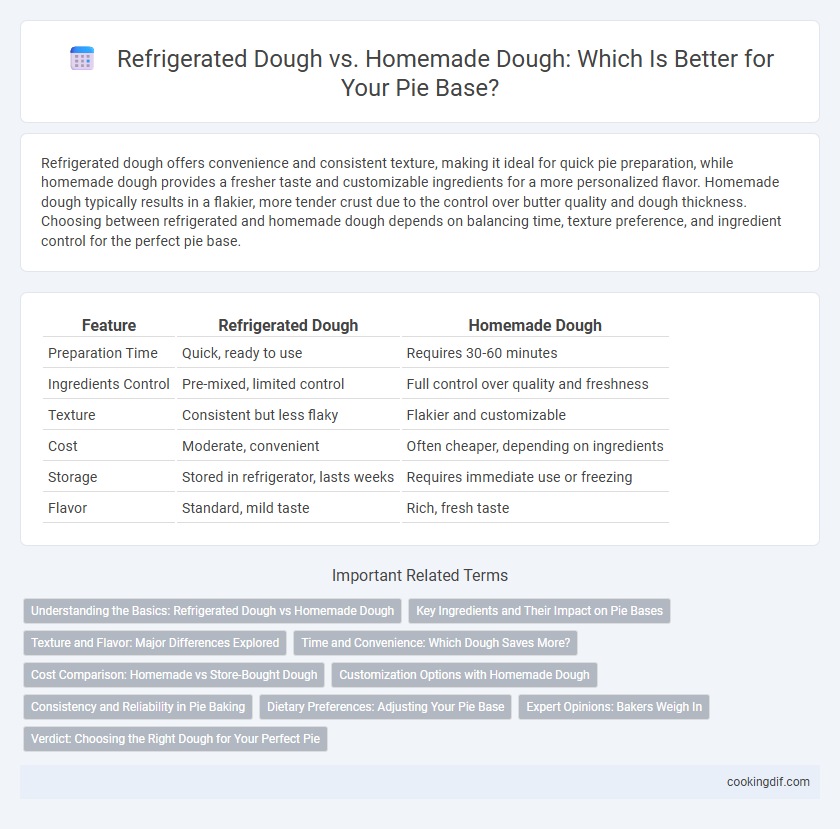Refrigerated dough offers convenience and consistent texture, making it ideal for quick pie preparation, while homemade dough provides a fresher taste and customizable ingredients for a more personalized flavor. Homemade dough typically results in a flakier, more tender crust due to the control over butter quality and dough thickness. Choosing between refrigerated and homemade dough depends on balancing time, texture preference, and ingredient control for the perfect pie base.
Table of Comparison
| Feature | Refrigerated Dough | Homemade Dough |
|---|---|---|
| Preparation Time | Quick, ready to use | Requires 30-60 minutes |
| Ingredients Control | Pre-mixed, limited control | Full control over quality and freshness |
| Texture | Consistent but less flaky | Flakier and customizable |
| Cost | Moderate, convenient | Often cheaper, depending on ingredients |
| Storage | Stored in refrigerator, lasts weeks | Requires immediate use or freezing |
| Flavor | Standard, mild taste | Rich, fresh taste |
Understanding the Basics: Refrigerated Dough vs Homemade Dough
Refrigerated dough offers convenience with a consistent texture and pre-measured ingredients, ideal for quick pie bases. Homemade dough allows for customization in flavor and texture, providing a flakier crust when using cold butter and precise mixing techniques. Choosing between the two depends on balancing time efficiency with desired freshness and control over pie quality.
Key Ingredients and Their Impact on Pie Bases
Refrigerated dough often contains preservatives, stabilizers, and higher fat content, which contribute to a consistently flaky and tender pie base ideal for quick preparation. Homemade dough relies on fundamental ingredients like flour, butter, salt, and water, allowing precise control over texture and flavor but requiring skill to achieve the perfect balance of tenderness and flakiness. The quality and ratio of fats, hydration, and handling techniques in homemade dough significantly impact the pie crust's crumb structure and overall taste compared to the standardized composition of refrigerated dough.
Texture and Flavor: Major Differences Explored
Refrigerated dough offers convenience with a consistently flaky texture due to pre-blended fats and standardized processes, while homemade dough provides a more customizable, tender crumb and richer flavor from fresh ingredients. The texture of refrigerated dough tends to be uniform but can sometimes lack the depth of flavor achieved by incorporating unique fats or techniques in homemade dough. Flavor intensity in homemade dough often surpasses refrigerated varieties, as the freshness and control over ingredient quality directly influence the pie base's taste.
Time and Convenience: Which Dough Saves More?
Refrigerated dough saves significant time by eliminating the need for mixing, chilling, and rolling, making it ideal for quick pie preparation. Homemade dough requires longer hands-on effort with steps like measuring ingredients, kneading, and resting, but offers control over ingredient quality and flavor customization. For convenience and speed, refrigerated dough is the more efficient choice, especially for busy schedules or last-minute baking.
Cost Comparison: Homemade vs Store-Bought Dough
Homemade pie dough generally costs less per pie, utilizing basic pantry ingredients like flour, butter, and water, which significantly reduces expenses compared to refrigerated dough bought at grocery stores. Store-bought refrigerated dough offers convenience but often comes at a premium price, sometimes double or triple the cost of homemade dough per unit. For budget-conscious bakers, making dough at home provides greater control over cost, quality, and ingredient freshness, leading to more economical and customizable pie bases.
Customization Options with Homemade Dough
Homemade dough offers extensive customization options for pie bases, allowing precise control over ingredients such as flour type, fat content, and sweetness levels to suit dietary needs or flavor preferences. Unlike refrigerated dough, which usually comes pre-mixed with standard ingredients, homemade dough can incorporate unique additions like herbs, spices, or alternative flours for gluten-free or vegan pies. This flexibility enhances the texture and taste of the crust, creating a more personalized and artisanal pie experience.
Consistency and Reliability in Pie Baking
Refrigerated dough offers consistent texture and reliable results due to its standardized ingredients and factory-controlled processes, ensuring uniform pie bases every time. Homemade dough can vary in consistency depending on technique, ingredient quality, and environmental factors, which may affect the flakiness and firmness of the crust. For bakers prioritizing predictable outcomes and time efficiency, refrigerated dough provides a dependable option, while homemade dough requires skill for consistent pie base quality.
Dietary Preferences: Adjusting Your Pie Base
Refrigerated dough offers convenience and consistent texture, often containing preservatives and fats that may not align with specific dietary preferences such as low sodium or gluten-free diets. Homemade dough allows precise control over ingredients, enabling adaptations for vegan, gluten-free, or low-fat requirements by selecting alternative flours and fats. Adjusting your pie base based on dietary needs ensures both flavor and nutritional goals are met without compromising texture or taste.
Expert Opinions: Bakers Weigh In
Expert bakers highlight that refrigerated dough offers consistent texture and time-saving convenience, making it ideal for quick pie preparation. Homemade dough, however, allows for customization in flavor and texture, often resulting in a flakier, more tender crust when crafted with quality ingredients. Many professionals recommend combining both approaches by using refrigerated dough as a base and enhancing it with homemade techniques like brushing with butter for optimal results.
Verdict: Choosing the Right Dough for Your Perfect Pie
Refrigerated dough offers convenience and consistent texture, making it ideal for quick, reliable pie bases, while homemade dough provides superior flavor and customizable flakiness for a more personalized pie experience. Factors such as time availability, desired crust quality, and ingredient control play crucial roles in this choice. Opt for homemade dough if you prioritize flavor and texture, but choose refrigerated dough for efficiency and ease in pie preparation.
Refrigerated dough vs homemade dough for pie base Infographic

 cookingdif.com
cookingdif.com